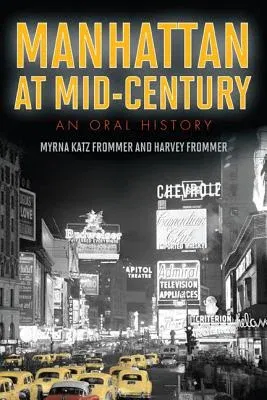Experience the mosaic of mid-century Manhattan in this exuberant oral
history that begins in the post-World War II years when the city came
into its own, and ends in the mid-1970s when it nearly went bust. This
is the story of a time when great ocean liners were docked in the Hudson
River ports, Checker cabs hurtled across a two-way Fifth Avenue, and the
Third Avenue el cast long shadows onto the street below. There are
recollections of Friday night boxing matches at the old Madison Square
Garden, of peddling tunes in the heart of Tin Pan Alley at the Brill
Building, of a Harlem that had a nightclub on every corner, and a SoHo
that was saved from a wrecker's ball by a "bunch of mothers." Eleven
daily newspapers covered the city beat back then, Automats and
five-and-dimes were in each neighborhood, and the New York Philharmonic
performed free summer concerts at Lewisohn Stadium on the City College
campus. Zabar's was a small dairy store; Balducci's was an open-air
fruit and vegetable stand. New York was becoming the center of haute
cuisine and haute couture; the New York School of abstract
expressionists had taken the lead from Paris in avant-garde art. This
transformative time when New York City became the capital of the world
is captured here in myriad memories that create an often humorous,
sometimes poignant, occasionally bitter--but always loving--testament to
the magical mystique of Manhattan. Includes interviews with Jimmy
Breslin, Bill Gallo, Monte Irvin, Robert Merrill, Herman Badillo, Elaine
Kaufman, Jerry Della Femina, Pauline Trigère, Sirio Maccioni, Jane
Jacobs, Saul Zabar, Margaret Whiting, and many more.

